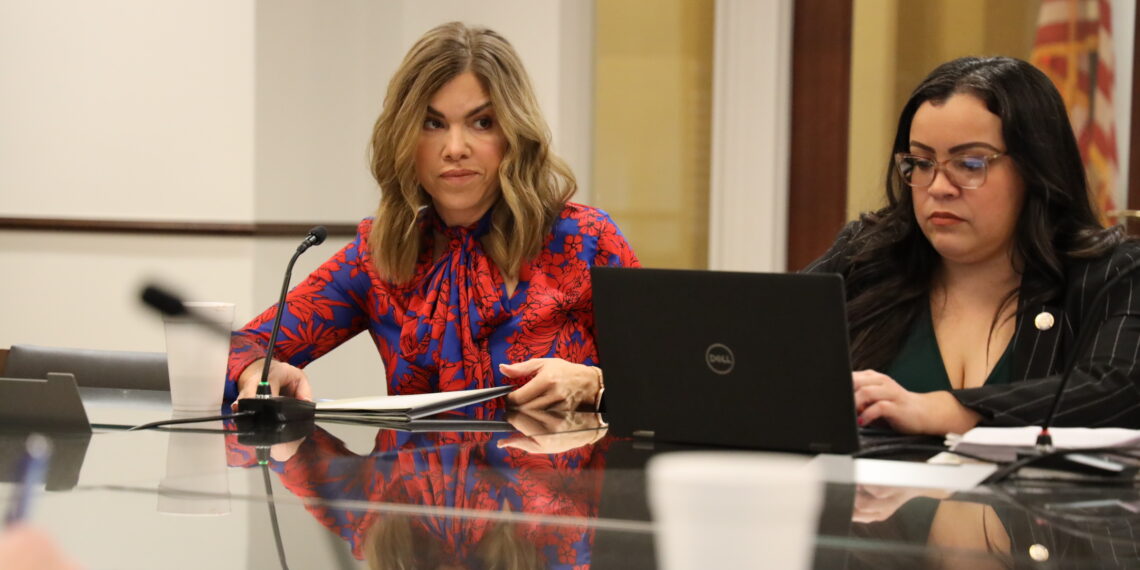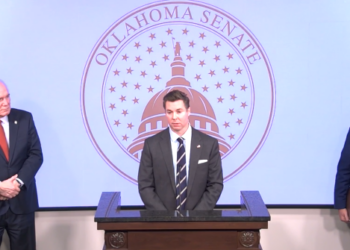OKLAHOMA CITY (OBV) — A bill that addresses Oklahoma’s childcare crisis by providing employers and childcare workers a tax credit unanimously passed a House of Representatives subcommittee on Monday.
House Bill 4147 succeeded in the House’s Appropriations and Budget Finance – Revenue and Taxation Subcommittee with a 7-0 vote.

The bill offers a 30 percent tax credit to employers who share in their employees’ childcare costs with their employees. The credit is capped at $30,000 per year, per employer, according to the bill’s co-author, Rep. Suzanne Schreiber, D-Tulsa.
HB 4147 also provides a $1,000 refundable tax credit to qualified childcare workers employed in licensed facilities.
Rep. Mark Lawson, R-Sapulpa, who co-authored the bill with Schreiber, spoke with OBV about the bill’s significance.
“Access to childcare across the state of Oklahoma is an issue top to bottom, urban, rural. Whether that’s private pay or subsidy slots, we know that we’ve got a lot of childcare deserts,” Lawson said. “So, I want to make sure that we take the approach of all of the above. If we can help companies tap into making childcare available with tax credits and House Bill 4147 — an all the above approach. I would I think that we as a state need to say yes to as many things as we can because quality childcare is important.”
Schreiber, who presented the bill to the subcommittee, spoke about HB 4147 during a State Chamber of Oklahoma legislative agenda news conference in January.
“The tax credit bill that we have offers two tracks on the tax credit. One is for employers and it offers a $30,000 tax credit for employers who either participate in sharing the costs with their employee, who buy into a childcare and buy slots for their employees or who operate or contract to operate a childcare. And that is something that 21 other states do. I know Oklahoma is totally ready to do it,” she said. “We are all about the public private partnerships. As a state, we offer a tax credit, incentivize those employers to participate with their employees in the cost of childcare. And it really solves a lot of problems. And like I said in the beginning, the childcare world is a very complicated, complex world.”
Schreiber has been a stalwart champion for childcare reform in Oklahoma.
Schreiber’s childcare legislation, House Bill 2452, succeeded in the Oklahoma Legislature last year and was signed into law by Gov. Kevin Stitt. The bill streamlines Oklahoma’s family childcare home licensing regulations to help daycares and other such facilities stay open, which ensures greater childcare availability for Oklahomans. It was a key bill in the legislative effort to expand childcare and get more parents back into the state’s workforce.
The Oklahoma Institute for Child Advocacy (OICA) presented Schreiber Freshman Legislator of the Year award for her legislative efforts to remedy Oklahoma’s childcare crisis.
Scores of working parents are impacted by what Schreiber and other childcare advocates have described as a crisis.
Childcare facilities have been on the decline in Oklahoma for more than a decade.
Oklahoma had more than 4,000 facilities in 2012; that number dwindled to 2,954 by 2021.
Carrie Williams, executive director of Oklahoma Child Care Resource and Referral, told Oklahoma Business Voice last April that 55 percent of Oklahoma is categorically listed as a childcare desert.
Williams also said long childcare waiting lists prevent many parents from getting their child into a facility.
“The wait list for childcare can be up to two years for an infant. So, they’re not an infant anymore by the time the parents can obtain childcare,” she said.
Oklahoma businesses have been adversely impacted by the childcare facility and worker shortage, seeing a 6.1 percent decline in workforce labor participation among Oklahoma mothers who have children ranging in age from infant to four years old.
“Often times the parent has to either leave the workforce or make a new work arrangement. It’s even harder if a family has nontraditional hours of care that they need; it’s very difficult to find childcare that operates outside traditional hours of 7 a.m. to 6 p.m.,” Williams said.
Parents nationwide are exiting the workforce due to diminishing childcare options.
A U.S. Chamber of Commerce Foundation study states that 58 percent of working parents reported leaving their job because they could not find viable childcare. Also, 32 percent of women surveyed said having to be home to care for family members made returning to work difficult.
The childcare shortage is not only causing parents to leave their job, it’s also preventing them from returning to work.
“Dropping out of the workforce to care for children greatly disadvantages women, often in the form of lower wages and missed promotions,” the U.S. Chamber report states.
Childcare breakdowns cause states to lose an average of $1 billion in economic activity annually, according to the foundation study. Part of the lost revenue stems from the cost of parents missing work because quality childcare was not available—or unaffordable.
The average cost of childcare in the U.S. ranges from $11,000 to $29,000 annually, according to the U.S. Chamber.
Oklahoma parents who manage to find a childcare facility nearby often have to contend with high childcare costs. Oklahoma is one of the 10 most expensive states for childcare costs, with families having spent 6.9 percent of their income on childcare in 2020.
Businesses are also adversely affected by childcare shortages. Childcare system gaps prevent businesses from fully re-staffing their operations, which leads to closures and operation hour reductions across all industries. The Foundation study states that employee absences and turnover costs employers anywhere from $400 million to $3 billion a year.
The state used funds from childcare desert grants as well as stabilization grants to help Oklahoma childcare centers and incentivize the opening of new centers, according to Williams.
Subsidized childcare aid provided through a federal Childcare Development Fund grant is helping low-income Oklahoma families reenter the workforce. It also aids individuals working in the childcare field.
The state has made a legislative budget request from the Department of Human Services for an additional $30 million in support of subsidized childcare, according to Williams.
Oklahoma must continually work to support and fortify childcare facilities, Schreiber said.
“Just like we stimulate other industries – nursing, aerospace, manufacturing, tech – we need to stimulate the childcare industry as well, because none of those other things actually work when we don’t have the childcare industry,” Schreiber said. “It doesn’t matter how much incentive we put into recruiting an employer if those employers don’t have the workers they need because the workers don’t have childcare.”

















